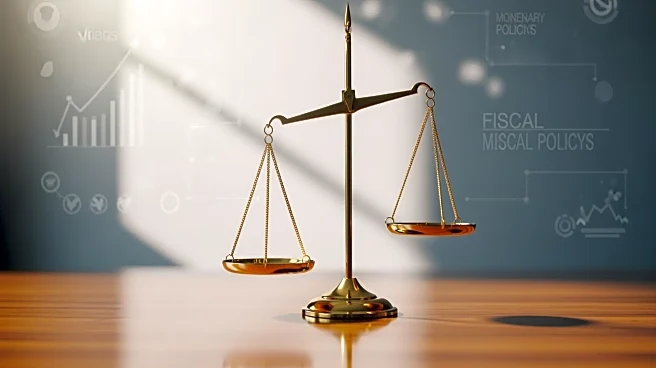What's Happening?
Monetary policy and fiscal policy are two primary tools used to influence a nation's economic activity. Monetary policy, managed by central banks like the U.S. Federal Reserve, involves controlling interest
rates and the money supply. Fiscal policy, determined by government legislation, involves taxation and government spending. While monetary policy aims to spark economic activity by incentivizing borrowing and spending, fiscal policy targets aggregate demand by adjusting the total level and composition of spending. Both policies have significant impacts on businesses and consumers, influencing economic growth and stability.
Why It's Important?
Understanding the differences between monetary and fiscal policy is crucial for effective economic management. Monetary policy can quickly influence economic conditions through interest rate adjustments, impacting borrowing costs and consumer spending. Fiscal policy, on the other hand, directly affects government budgets and can lead to increased employment and income through strategic spending and tax policies. The interplay between these policies is vital for maintaining economic stability and addressing challenges such as inflation and recession. Policymakers must carefully balance these tools to achieve desired economic outcomes.
What's Next?
Future economic strategies may involve coordinated efforts between monetary and fiscal policy to address complex challenges like climate change and technological disruption. Policymakers may explore innovative fiscal measures to stimulate growth and enhance social welfare. Continuous monitoring and evaluation of both policies will be essential to ensure their effectiveness and adapt to changing economic conditions. The role of central banks and governments in managing economic cycles will remain critical as they navigate global uncertainties and domestic priorities.
Beyond the Headlines
The ethical implications of monetary and fiscal policy are significant, as they can impact wealth distribution and social equity. Cultural factors also play a role, as these policies can shape societal values and priorities. Legal challenges, such as compliance with international agreements, can affect the implementation of economic strategies. Long-term shifts in economic structures may result from these policies, impacting employment patterns and social stability.









